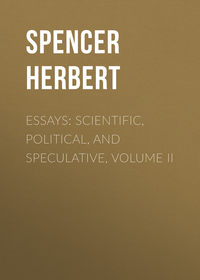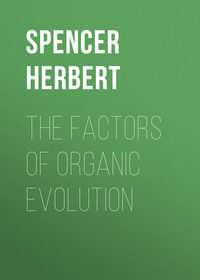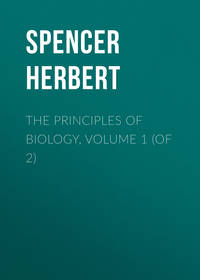 полная версия
полная версияThe Data of Ethics
§ 89. In yet one more way may be shown the inconsistency of this transfigured utilitarianism which regards its doctrine as embodying the Christian maxim – "Love your neighbor as yourself," and of that altruism which, going still further, enunciates the maxim – "Live for others."
A right rule of conduct must be one which may with advantage be adopted by all. "Act according to that maxim only, which you can wish, at the same time, to become a universal law," says Kant. And clearly, passing over needful qualifications of this maxim, we may accept it to the extent of admitting that a mode of action which becomes impracticable as it approaches universality, must be wrong. Hence, if the theory of pure altruism, implying that effort should be expended for the benefit of others and not for personal benefit, is defensible, it must be shown that it will produce good results when acted upon by all. Mark the consequences if all are purely altruistic.
First, an impossible combination of moral attributes is implied. Each is supposed by the hypothesis to regard self so little and others so much, that he willingly sacrifices his own pleasures to give pleasures to them. But if this is a universal trait, and if action is universally congruous with it, we have to conceive each as being not only a sacrificer but also one who accepts sacrifices. While he is so unselfish as willingly to yield up the benefit for which he has labored, he is so selfish as willingly to let others yield up to him the benefits they have labored for. To make pure altruism possible for all, each must be at once extremely unegoistic and extremely egoistic. As a giver, he must have no thought for self; as a receiver, no thought for others. Evidently, this implies an inconceivable mental constitution. The sympathy which is so solicitous for others as willingly to injure self in benefiting them, cannot at the same time be so regardless of others as to accept benefits which they injure themselves in giving.
The incongruities that emerge if we assume pure altruism to be universally practiced, may be otherwise exhibited thus. Suppose that each, instead of enjoying such pleasures as come to him, or such consumable appliances to pleasure as he has worked for, or such occasions for pleasure as reward his efforts, relinquishes these to a single other, or adds them to a common stock from which others benefit, what will result? Different answers may be given according as we assume that there are, or are not, additional influences brought into play.
Suppose there are no additional influences. Then, if each transfers to another his happiness, or means to happiness, or occasions for happiness, while some one else does the like to him, the distribution of happiness is, on the average, unchanged; or if each adds to a common stock his happiness, or means to happiness, or occasions for happiness, from which common stock each appropriates his portion, the average state is still, as before, unchanged. The only obvious effect is that transactions must be gone through in the redistribution; and loss of time and labor must result.
Now suppose some additional influence which makes the process beneficial; what must it be? The totality can be increased only if the acts of transfer increase the quantity of that which is transferred. The happiness, or that which brings it, must be greater to one who derives it from another's efforts than it would have been had his own efforts procured it; or otherwise, supposing a fund of happiness, or of that which brings it, has been formed by contributions from each, then each, in appropriating his share, must find it larger than it would have been had no such aggregation and dispersion taken place. To justify belief in such increase two conceivable assumptions may be made. One is that though the sum of pleasures, or of pleasure-yielding things, remains the same yet the kind of pleasure, or of pleasure-yielding things, which each receives in exchange from another, or from the aggregate of others, is one which he appreciates more than that for which he labored. But to assume this is to assume that each labors directly for the thing which he enjoys less, rather than for the thing which he enjoys more, which is absurd. The other assumption is that while the exchanged, or redistributed pleasure of the egoistic kind, remains the same in amount for each, there is added to it the altruistic pleasure accompanying the exchange. But this assumption is clearly inadmissible if, as is implied, the transaction is universal – is one through which each becomes giver and receiver to equal extents. For if the transfer of pleasures, or of pleasure-yielding things, from one to another or others, is always accompanied by the consciousness that there will be received from him or them an equivalent; there results merely a tacit exchange, either direct or roundabout. Each becomes altruistic in no greater degree than is implied by being equitable; and each, having nothing to exalt his happiness, sympathetically or otherwise, cannot be a source of sympathetic happiness to others.
§ 90. Thus, when the meanings of its words are inquired into, or when the necessary implications of its theory are examined, pure altruism, in whatever form expressed, commits its adherents to various absurdities.
If "the greatest happiness of the greatest number," or in other words, "the general happiness," is the proper end of action, then not only for all public action but for all private action, it must be the end; because, otherwise, the greater part of action remains unguided. Consider its fitness for each. If corporate action is to be guided by the principle, with its interpreting comment, "everybody to count for one, nobody for more than one," there must be an ignoring of all differences of character and conduct, merits and demerits, among citizens, since no discrimination is provided for, and, moreover, since that in respect of which all are to count alike cannot be happiness itself, which is indistributable, and since equal sharing of the concrete means to happiness, besides failing ultimately would fail proximately to produce the greatest happiness; it results that equal distribution of the conditions under which happiness may be pursued is the only tenable meaning: we discover in the principle nothing but a round-about insistance on equity. If, taking happiness at large as the aim of private action, the individual is required to judge between his own happiness and that of others as an impartial spectator would do, we see that no supposition concerning the spectator save one which suicidally ascribes partiality to him, can bring out any other result than that each shall enjoy such happiness, or appropriate such means to happiness, as his own efforts gain: equity is again the sole content. When, adopting another method, we consider how the greatest sum of happiness may be composed, and, recognizing the fact that equitable egoism will produce a certain sum, ask how pure altruism is to produce a greater sum; we are shown that if all, exclusively pursuing altruistic pleasures, are so to produce a greater sum of pleasures, the implication is that altruistic pleasures, which arise from sympathy, can exist in the absence of egoistic pleasures with which there may be sympathy – an impossibility; and another implication is that if, the necessity for egoistic pleasures being admitted, it is said that the greatest sum of happiness will be attained if all individuals are more altruistic than egoistic, it is indirectly said that as a general truth, representative feelings are stronger than presentative feelings – another impossibility. Again, the doctrine of pure altruism assumes that happiness may be to any extent transferred or redistributed; whereas the fact is that pleasures of one order cannot be transferred in large measure without results which are fatal or extremely injurious, and that pleasures of another order cannot be transferred in any degree. Further, pure altruism presents this fatal anomaly, that while a right principle of action must be more and more practiced as men improve, the altruistic principle becomes less and less practicable as men approach an ideal form, because the sphere for practicing it continually decreases. Finally its self-destructiveness is made manifest on observing that for all to adopt it as a principle of action, which they must do if it is a sound principle, implies that all are at once extremely unegoistic and extremely egoistic – ready to injure self for others' benefit, and ready to accept benefit at the cost of injury to others: traits which cannot co-exist.
The need for a compromise between egoism and altruism is thus made conspicuous. We are forced to recognize the claims which his own well-being has on the attention of each by noting how, in some directions we come to a deadlock, in others to contradictions, and in others to disastrous results, if they are ignored. Conversely, it is undeniable that disregard of others by each, carried to a great extent, is fatal to society, and carried to a still greater extent is fatal to the family, and eventually to the race. Egoism and altruism are therefore co-essential.
§ 91. What form is the compromise between egoism and altruism to assume? how are their respective claims to be satisfied in due degrees?
It is a truth insisted on by moralists and recognized in common life, that the achievement of individual happiness is not proportionate to the degree in which individual happiness is made the object of direct pursuit; but there has not yet become current the belief that, in like manner, the achievement of general happiness is not proportionate to the degree in which general happiness is made the object of direct pursuit. Yet failure of direct pursuit in the last case is more reasonably to be expected than in the first.
When discussing the relations of means and ends, we saw that as individual conduct evolves, its principle becomes more and more that of making fulfillment of means the proximate end, and leaving the ultimate end, welfare or happiness, to come as a result. And we saw that when general welfare or happiness is the ultimate end, the same principle holds even more rigorously; since the ultimate end under its impersonal form is less determinate than under its personal form, and the difficulties in the way of achieving it by direct pursuit still greater. Recognizing, then, the fact that corporate happiness still more than individual happiness, must be pursued not directly, but indirectly, the first question for us is – What must be the general nature of the means through which it is to be achieved.
It is admitted that self-happiness is, in a measure, to be obtained by furthering the happiness of others. May it not be true that, conversely, general happiness is to be obtained by furthering self-happiness? If the well-being of each unit is to be reached partly through his care for the well-being of the aggregate, is not the well-being of the aggregate to be reached partly through the care of each unit for himself? Clearly, our conclusion must be that general happiness is to be achieved mainly through the adequate pursuit of their own happiness by individuals; while, reciprocally, the happiness of individuals are to be achieved in part by their pursuit of the general happiness.
And this is the conclusion embodied in the progressing ideas and usages of mankind. This compromise between egoism and altruism has been slowly establishing itself; and toward recognition of its propriety, men's actual beliefs, as distinguished from their nominal beliefs, have been gradually approaching. Social evolution has been bringing about a state in which the claims of the individual to the proceeds of his activities, and to such satisfactions as they bring, are more and more positively asserted; at the same time that insistance on others' claims, and habitual respect for them have been increasing. Among the rudest savages personal interests are very vaguely distinguished from the interests of others. In early stages of civilization the proportioning of benefits to efforts is extremely rude: slaves and serfs get for work arbitrary amounts of food and shelter: exchange being infrequent, there is little to develop the idea of equivalence. But as civilization advances and status passes into contract there comes daily experience of the relation between advantages enjoyed and labor given: the industrial system maintaining, through supply and demand, a due adjustment of the one to the other. And this growth of voluntary co-operation, this exchange of services under agreement, has been necessarily accompanied by decrease of aggressions one upon another, and increase of sympathy: leading to exchange of services beyond agreement. That is to say, the more distinct assertions of individual claims, and more rigorous apportioning of personal enjoyments to efforts expended, has gone hand in hand with growth of that negative altruism shown in equitable conduct and that positive altruism shown in gratuitous aid.
A higher phase of this double change has in our own times become conspicuous. If, on the one hand, we note the struggles for political freedom, the contests between labor and capital, the judicial reforms made to facilitate enforcement of rights, we see that the tendency still is toward complete appropriation by each of whatever benefits are due to him, and consequent exclusion of his fellows from such benefits. On the other hand, if we consider what is meant by the surrender of power to the masses, the abolition of class-privileges, the efforts to diffuse knowledge, the agitations to spread temperance, the multitudinous philanthropic societies; it becomes clear that regard for the well-being of others is increasing pari passu with the taking of means to secure personal well-being.
What holds of the relations within each society holds to some extent, if to a less extent, of the relations between societies. Though, to maintain national claims, real or imaginary, often of a trivial kind, the civilized still make war on one another; yet their several nationalities are more respected than in past ages. Though by victors portions of territory are taken and money compensations exacted; yet conquest is not now, as of old, habitually followed by entire appropriation of territories and enslavement of peoples. The individualities of societies are in a larger measure preserved. Meanwhile the altruistic intercourse is greater: aid is rendered on occasions of disaster by flood, by fire, by famine, or otherwise. And in international arbitration as lately exemplified, implying the recognition of claims by one nation upon another, we see a further progress in this wider altruism. Doubtless there is much to be said by way of set-off; for in the dealings of the civilized with the uncivilized little of this progress can be traced. It may be urged that the primitive rule, "Life for life," has been developed by us into the rule, "For one life many lives," as in the cases of Bishop Patteson and Mr. Birch, but then there is the qualifying fact that we do not torture our prisoners or mutilate them. If it be said that as the Hebrews thought themselves warranted in seizing the lands God promised to them, and in some cases exterminating the inhabitants, so we, to fulfill the "manifest intention of Providence," dispossess inferior races whenever we want their territories; it may be replied that we do not kill many more than seems needful, and tolerate the existence of those who submit. And should any one point out that as Attila, while conquering or destroying peoples and nations, regarded himself as "the scourge of God," punishing men for their sins, so we, as represented by a High Commissioner and a priest he quotes, think ourselves called on to chastise with rifles and cannon, heathens who practice polygamy; there is the rejoinder that not even the most ferocious disciple of the teacher of mercy would carry his vengeance so far as to depopulate whole territories and erase scores of cities. And when, on the other hand, we remember that there is an Aborigines Protection Society, that there are Commissioners in certain colonies appointed to protect native interests, and that in some cases the lands of natives have been purchased in ways which, however unfair, have implied some recognition of their claims; we may say that little as the compromise between egoism and altruism has progressed in international affairs, it has still progressed somewhat in the direction indicated.
CHAPTER XIV.
CONCILIATION
§ 92. As exhibited in the last chapter, the compromise between the claims of self and the claims of others seems to imply permanent antagonism between the two. The pursuit by each of his own happiness while paying due regard to the happiness of his fellows, apparently necessitates the ever-recurring question – How far must the one end be sought and how far the other: suggesting, if not discord in the life of each, still, an absence of complete harmony. This is not the inevitable inference however.
When, in the Principles of Sociology, Part III, the phenomena of race-maintenance among living things at large were discussed, that the development of the domestic relations might be the better understood, it was shown that during evolution there has been going on a conciliation between the interests of the species, the interests of the parents, and the interests of the offspring. Proof was given that as we ascend from the lowest forms of life to the highest, race-maintenance is achieved with a decreasing sacrifice of life, alike of young individuals and of adult individuals, and also with a decreasing sacrifice of parental lives to the lives of offspring. We saw that, with the progress of civilization, like changes go on among human beings; and that the highest domestic relations are those in which the conciliation of welfares within the family becomes greatest, while the welfare of the society is best subserved. Here it remains to be shown that a kindred conciliation has been, and is, taking place between the interests of each citizen and the interests of citizens at large; tending ever toward a state in which the two become merged in one, and in which the feelings answering to them respectively, fall into complete concord.
In the family group, even as we observe it among many inferior vertebrates, we see that the parental sacrifice, now become so moderate in amount as to consist with long-continued parental life, is not accompanied by consciousness of sacrifice; but contrariwise, is made from a direct desire to make it: the altruistic labors on behalf of young are carried on in satisfaction of parental instincts. If we trace these relations up through the grades of mankind, and observe how largely love rather than obligation prompts the care of children, we see the conciliation of interests to be such that achievement of parental happiness coincides with securing the happiness of offspring: the wish for children among the childless, and the occasional adoption of children, showing how needful for attainment of certain egoistic satisfactions are these altruistic activities. And further evolution, causing along with higher nature diminished fertility, and therefore smaller burdens on parents, may be expected to bring a state in which, far more than now, the pleasures of adult life will consist in raising offspring to perfection while simultaneously furthering the immediate happiness of offspring.
Now though altruism of a social kind, lacking certain elements of parental altruism, can never attain the same level, yet it may be expected to attain a level at which it will be like parental altruism in spontaneity – a level such that ministration to others' happiness will become a daily need – a level such that the lower egoistic satisfactions will be continually subordinated to this higher egoistic satisfaction, not by any effort to subordinate them, but by the preference for this higher egoistic satisfaction whenever it can be obtained.
Let us consider how the development of sympathy, which must advance as fast as conditions permit, will bring about this state.
§ 93. We have seen that during the evolution of life, pleasures and pains have necessarily been the incentives to, and deterrents from, actions which the conditions of existence demanded and negatived. An implied truth to be here noted is, that faculties which, under given conditions, yield partly pain and partly pleasure, cannot develop beyond the limit at which they yield a surplus of pleasure: if beyond that limit more pain than pleasure results from exercise of them, their growth must be arrested.
Through sympathy both these forms of feeling are excited. Now a pleasurable consciousness is aroused on witnessing pleasure; now a painful consciousness is aroused on witnessing pain. Hence, if beings around him habitually manifest pleasure and but rarely pain, sympathy yields to its possessor a surplus of pleasure; while, contrariwise, if little pleasure is ordinarily witnessed and much pain, sympathy yields a surplus of pain to its possessor. The average development of sympathy must, therefore, be regulated by the average manifestations of pleasure and pain in others. If the life usually led under given social conditions is such that suffering is daily inflicted, or is daily displayed by associates, sympathy cannot grow: to assume growth of it is to assume that the constitution will modify itself in such way as to increase its pains and therefore depress its energies; and is to ignore the truth that bearing any kind of pain gradually produces insensibilty to that pain, or callousness. On the other hand, if the social state is such that manifestations of pleasure predominate, sympathy will increase; since sympathetic pleasures, adding to the totality of pleasures enhancing vitality, conduce to the physical prosperity of the most sympathetic, and since the pleasures of sympathy exceeding its pains in all, lead to an exercise of it which strengthens it.
The first implication is one already more than once indicated. We have seen that along with habitual militancy and under the adapted type of social organization, sympathy cannot develop to any considerable height. The destructive activities carried on against external enemies sear it; the state of feeling maintained causes within the society itself frequent acts of aggression or cruelty; and further, the compulsory co-operation characterizing the militant régime necessarily represses sympathy – exists only on condition of an unsympathetic treatment of some by others.
But even could the militant régime forthwith end, the hinderance to development of sympathy would still be great. Though cessation of war would imply increased adaptation of man to social life, and decrease of sundry evils, yet there would remain much non-adaptation and much consequent unhappiness. In the first place, that form of nature which has generated and still generates wars, though by implication raised to a higher form, would not at once be raised to so high a form that there would cease all injustices and the pains they cause. For a considerable period after predatory activities had ended, the defects of the predatory nature would continue: entailing their slowly diminishing evils. In the second place, the ill-adjustment of the human constitution to the pursuits of industrial life, must long persist, and may be expected to survive in a measure the cessation of wars: the required modes of activity must remain for innumerable generations in some degree displeasurable. And in the third place, deficiencies of self-control such as the improvident show us, as well as those many failures of conduct due to inadequate foresight of consequences, though less marked than now, could not fail still to produce suffering.
Nor would even complete adaptation, if limited to disappearance of the non-adaptations just indicated, remove all sources of those miseries which, to the extent of their manifestation, check the growth of sympathy. For while the rate of multiplication continues so to exceed the rate of mortality as to cause pressure on the means of subsistence, there must continue to result much unhappiness; either from balked affections or from overwork and stinted means. Only as fast as fertility diminishes, which we have seen it must do along with further mental development (Principles of Biology, §§ 367–377), can there go on such diminution of the labors required for efficiently supporting self and family, that they will not constitute a displeasurable tax on the energies.
Gradually then, and only gradually, as these various causes of unhappiness become less can sympathy become greater. Life would be intolerable if, while the causes of misery remained as they now are, all men were not only in a high degree sensitive to the pains, bodily and mental, felt by those around and expressed in the faces of those they met, but were unceasingly conscious of the miseries everywhere being suffered as consequences of war, crime, misconduct, misfortune, improvidence, incapacity. But, as the molding and re-molding of man and society into mutual fitness progresses, and as the pains caused by unfitness decrease, sympathy can increase in presence of the pleasures that come from fitness. The two changes are indeed so related that each furthers the other. Such growth of sympathy as conditions permit, itself aids in lessening pain and augmenting pleasure: and the greater surplus of pleasure that results makes possible further growth of sympathy.









